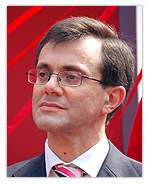 |
Paolo Sabbatini, an Italian Diplomat, was born in Italy in 1955. He is married to a colleague of the Italian Foreign Office since 1984; their 19-year old son is studying in London. From 2006 to 2011 he was living in Shanghai, being the Director of the Italian Culture office of the consulate general of Italy. He is currently Director of the Italian Culture Institute in Prague.
In 1979 Mr. Sabbatini obtained the Degree in Political Sciences (Magna Cum Laude in Philosophy of Politics) at the Rome University; he also holds a Master Diploma of International Economics awarded by the Commercial University “L. Bocconi” of Milano, Italy, one of the most prestigious European Schools. He also studied at the Universities of Montpellier and Tours, France, and at the Diplomatic Academy in Rome (SIOI).
Mr. Sabbatini has a wide experience (24 years) in international relations, public affairs and top-level negotiations. He joined the United Nations in 1982 and has monitored the development projects financed by the United Nations Development Programme in Morocco, India and China until 1988. He became an expert in project design and evaluation, and trained government officers in various countries using a training course which has been since adopted by the UNDP worldwide and published in the UNDP Manual. He also underwent a comprehensive training in Administration, Finance and Human Resource Management meant to prepare him for directive functions at the UN.
In 1989 Mr. Sabbatini was assigned to the Development Cooperation Department of the Ministry of Foreign Affairs of Italy as a Senior Expert and Officer. In this function he negotiated development country programmes worldwide and refined his negotiating skills. Until 1993, he participated in several top-level negotiations on behalf of the Italian Government, and led some of them, having Ministers of Foreign Affairs of other countries as counterparts. For this successful activity, and for his talent in mediating opinions and obtaining agreement in difficult issues, he was awarded the title of Grand Officer of the Government of Peru in 1993.
In 1993 Mr. Sabbatini was nominated Director of Operations of Unicef in Pakistan. His duties included the management of the Administration, Personnel, Finance and Supply of one Country Office and 4 Provincial Offices, with a staff of 160 (including 60 Professionals) and an Annual Country Programme of USD 25 Million. In this functions he further refined his fundraising skills and his capacity to combine multilateral and bilateral funds. Being in charge of relations with the Ministry of Foreign Affairs of Pakistan and technical counterparts for areas of competence, he established precious contacts which would prove essential for his future career. He acted also as Human Resource Manager (recruitment, moves, promotions, dismissal, career development) and Training Officer in the “project cycle” and related issues.
From 1993 to 2001 Mr. Sabbatini’s expertise in development projects was again requested by the Ministry of Foreign Affairs of Italy. In 1999 he negotiated a major institutional project with the Government of China, in the field of Energy; in 2000 and 2001 a major institutional project with the Government of Argentina, in the field of micro-enterprise development; in 2001 a major institutional project with the Government of Tunisia in the field of economic development.
In 2001 Mr. Sabbatini wanted to enlarge his knowledge and comprehension of the development arena through an experience with a major International NGO, knowing that the concept of “Civil Society” now encompasses a wide range of actors, who sit as equals in international meetings, and represent Governments, UN and major NGOs. He therefore accepted a 2-year contract with World Vision International to act as Government Relations Coordinator, and successfully carried out difficult diplomatic tasks thanks to his worldwide network of acquaintances. He obtained from the Pakistani Government the formal recognition of World Vision during the “Afghan crisis” (2001).
He returned to the Ministry of Foreign Affairs of Italy in October 2003, and since then he worked at the Office of the Director-General for Culture, Science and Technology. As such, he provided strategic and substantive support in the executive direction and management of the office; helps to establish policies and management for the participation of Italy in the international projects in the field of culture, Science and Technology (the annual budget directly administered by the Direction General is approximately Euros 280.000); helped to supervise activities, policies, performances and auditing of the Italian Cultural Centers in the world (a network of 98 Institutes).
Mr. Sabbatini has a relevant academic experience which dates from 1979. A brilliant lecturer, he has given many conferences in various countries, especially concerning international relations, and since 2001 has had teaching positions at the University of Reggio Calabria (Italy).
He is fully conversant in 3 main languages (English , French, Spanish). He keeps studying Arabic, Chinese and German.
Major Publications
Several articles on economy and current social issues on the Italian Magazine Panorama per i Giovani, Rome, Italy (from 1975 to 1979)
Perspectives of Intermediate Technology, appropriate to the conditions of developing countries, University of Rome, in cooperation with the Food and Agriculture Organization (FAO)(1979)
Theoretical and Practical Course on Development Projects Design and Evaluation, UNDP, Programme and Procedures Manual, New York, U.S.A. (1986)
Italy and the Mediterranean: occasions for development, Il Mulino, Bologna, Italy (2001)
Assignments
Councillor for the Arts, City Hall in Shanghai - Shanghai Jingan City Hall - Xu Hui (China).
Councillor for the Arts, National Technological District of Hangzhou - Binjiang.
Special Advisor, Shanghai Theatre Academy.
Advisor to the Museum Hsu Liu Hai, Shanghai.
Expert for the Italian Opera, Shanghai Grand Theatre and Orchestra Da Zhong, Xu Hui, Shanghai.
Artistic Advisor Group Heng Yuan Shang, Beijing, Shanghai.
|